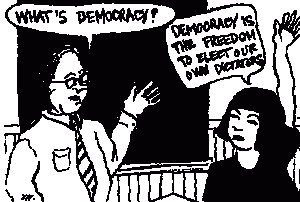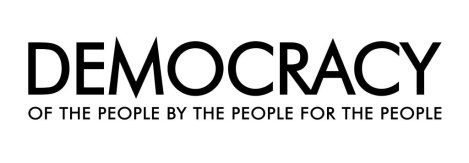What is democracy? The question this session started with. It is amazing the variety of views that came from this question and how some of these views were contested, showing that democracy means different things to different people. When we talk of democracy what immediately comes to mind to me is accountability, elections and representation.

However one question keeps playing on my mind. Is democracy the best form of governance for every country or is it the ideal that every country should to attain. Moller & Skaaning (2013) talked about four different types of democracies, looking at the extent to which factors such as the existence quality elections, rule of law and civil liberties exist. In one extreme we have the liberal democracy where all these factors exist and on the other extreme we have the minimalist democracy where only competitive elections is ensured.
There seems to be a consensus among theorists that democracy is an ideal form of governance. However if it is suitable for every country and how it should be introduced into countries which were not previously practicing it remains contested. One school of thought believe in “democratic sequencing” such that certain preconditions should be in place before a country democratizes, such conditions include observance of the rule of law and a well-functioning state. To them, “It is a mistake to assume that democracy- especially open national elections- is always a good idea” (Carothers, 2007). I tend to lean strongly towards this argument.
However it is argued that this is an ideal sort of situation which would be hard to achieve, considering how democracy and elections have become a popular means by which individuals in different parts of the world express their rights. “Elections-even if held hurriedly and before all conditions are ideal-have become the most visible embodiment of their aspiration to self-rule and the urgency with which they feel it” (Carothers, 2007). Individuals may not be willing to wait till all conditions are right before the introduction of elections. Countries such as Egypt and Tunisia are examples of how elections seem now, to be the first step towards democracy.
From this session I learnt that though it would be ideal to have all the conditions of liberal democracy existing before introducing elections into a country, in reality it would be a difficult task to achieve. However, that does not mean it is impossible to achieve democracy by first introducing elections into a country. This process provides a new means of introducing democracy which would be associated with its own challenges, as was the introduction of democracy to the West.
Bibliography
Carothers, T., 2007. How Democracies Emerge: The Sequencing Fallacy. Journal of Democracy, 18(1).
Moller, J. & Skaaning, S.-E., 2013. Regime Types and Democratic Sequencing. Journal of Democracy, 24(1), pp. 142-155.
